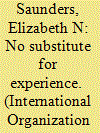|
|
|
Sort Order |
|
|
|
Items / Page
|
|
|
|
|
|
|
| Srl | Item |
| 1 |
ID:
153562


|
|
|
|
|
| Summary/Abstract |
Despite advances in the study of individuals in international relations, we still know little about how the traits and biases of individuals aggregate. Most foreign policy decisions are made in groups, usually by elites with varying degrees of experience, which can have both positive and negative psychological effects. This paper addresses the aggregation problem by exploring how the balance of foreign policy experience among leaders and advisers affects decision making in war, using a principal-agent framework that allows the relative experience of leaders and advisers to vary. A leader's experience affects decision making and, ultimately, the risks associated with conflict, through three mechanisms. First, experience influences a leader's ability to monitor advisers. Second, a leader's experience affects the credibility of delegation to experienced advisers and, in turn, the nature and extent of information gathering. Third, experience affects whether leaders are able to diversify advice, as well as their preference for policies that appear certain. I illustrate the argument using two cases that hold an unusual number of factors constant: the 1991 and 2003 Iraq Wars. George W. Bush's inexperience exacerbated the biases of his advisers, whereas his father's experience cast a long shadow over many of the same officials. Understanding the experience and biases of any one individual is insufficient—the balance of experience within a group is also important. Experience is therefore not fungible: a seasoned team cannot substitute for an experienced leader.
|
|
|
|
|
|
|
|
|
|
|
|
|
|
|
|
| 2 |
ID:
176676


|
|
|
|
|
| Summary/Abstract |
This paper presents an evaluation of four energy transition scenarios under consideration of multiple stakeholder opinions. We construct a multi-criteria group decision model that applies Value-Focused Thinking to construct a holistic objective system and uses Multi-Attribute Utility Theory to evaluate the energy transition scenarios. Although the individual scenario evaluations show that the opinions of the stakeholders towards a sustainable energy transition differ largely, we are able to identify three main strands of opinions among the considered stakeholders. By bundling the stakeholder interests by employing a k-means clustering technique, we derive detailed policy recommendations for a sustainable energy transition. For the case of Germany, these are to reduce GHG and pollutant emissions and at the same time enable citizens’ participation, limit the visual impact on landscapes, and ensuring internationally comparable energy-related political frameworks for the economy. For the case of a sustainable energy transition in Germany, we find that the stakeholders considered prefer either the highly ambitious Climate Protection scenario (Scenario B) or the Pan-European scenario (Scenario C). The main novelties of the study are that stakeholders are included in every step of the decision-making process and that very comprehensive energy transition scenarios, comprising the electricity, transport, heat, and industry sectors, are considered.
|
|
|
|
|
|
|
|
|
|
|
|
|
|
|
|
| 3 |
ID:
043165


|
|
|
|
|
| Publication |
Cambridge, University Press, 1971.
|
| Description |
viii, 184p.
|
| Standard Number |
0521079616
|
|
|
|
|
|
|
|
|
|
|
|
Copies: C:1/I:0,R:0,Q:0
Circulation
| Accession# | Call# | Current Location | Status | Policy | Location |
| 007958 | 302.3/PAT 007958 | Main | On Shelf | General | |
|
|
|
|
|
|
|
|
|